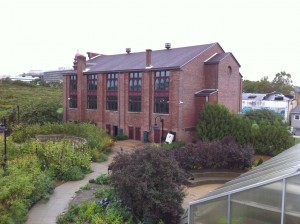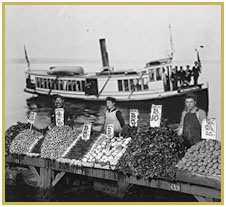The inevitable decreasing availability of cheap fossil fuel will eventually make the transportation of food over long distances economically unfeasible, and the phrase “local food” will acquire an urgent, vital meaning beyond the current limited lifestyle implications. Local food will become less about maintaining eco-correctness and more about whether we’re going to have enough to eat! Urban agriculture is one solution, as is a food security plan that includes low carbon transportation and a new relationship with city dwellers and the farmers in the food shed. These are a few examples of working urban farms, and a proposal for a “foodshed” preservation plan similar to the watershed plan that NYC negotiated with upstate farmers to avoid the need for expensive filtration plants.
One of the world leaders in urban agriculture and inner city food security is Will Allen’s 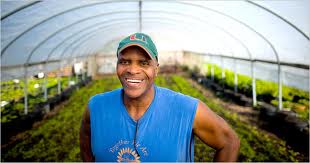 Growing Power. “Growing Power is a national nonprofit organization and land trust supporting people from diverse backgrounds, and the environments in which they live, by helping to provide equal access to healthy, high-quality, safe and affordable food for people in all communities. Growing Power implements this mission by providing hands-on training, on-the-ground demonstration, outreach and technical assistance through the development of Community Food Systems that help people grow, process, market and distribute food in a sustainable manner.”
Growing Power. “Growing Power is a national nonprofit organization and land trust supporting people from diverse backgrounds, and the environments in which they live, by helping to provide equal access to healthy, high-quality, safe and affordable food for people in all communities. Growing Power implements this mission by providing hands-on training, on-the-ground demonstration, outreach and technical assistance through the development of Community Food Systems that help people grow, process, market and distribute food in a sustainable manner.”
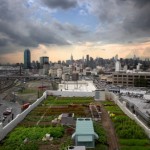 In the NYC Bioregion one of the leaders in urban roof top agriculture is Brooklyn Grange Farms. “Brooklyn Grange is the leading rooftop farming and intensive green roofing business in the US. We operate the world’s largest rooftop soil farms, located on two roofs in New York City, and grow over 40,000 lbs of organically-cultivated produce per year. In addition to growing and distributing fresh local vegetables and herbs, Brooklyn Grange also provides urban farming and green roof consulting and installation services to clients worldwide, and we partner with numerous non-profit organizations throughout New York to promote healthy and strong local communities.”
In the NYC Bioregion one of the leaders in urban roof top agriculture is Brooklyn Grange Farms. “Brooklyn Grange is the leading rooftop farming and intensive green roofing business in the US. We operate the world’s largest rooftop soil farms, located on two roofs in New York City, and grow over 40,000 lbs of organically-cultivated produce per year. In addition to growing and distributing fresh local vegetables and herbs, Brooklyn Grange also provides urban farming and green roof consulting and installation services to clients worldwide, and we partner with numerous non-profit organizations throughout New York to promote healthy and strong local communities.”
Another start up is City Food, CityFood™ is a “triple bottom line” vertically integrated 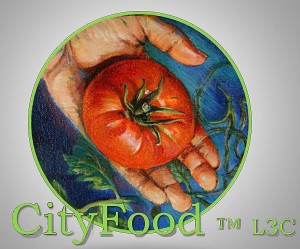 sustainable green business consulting firm and incubator focused on developing urban agricultural facilities, fostering farm and urban relationships and infrastructure and logistics for local food.
sustainable green business consulting firm and incubator focused on developing urban agricultural facilities, fostering farm and urban relationships and infrastructure and logistics for local food.
“The greater Newark (NJ) Conservancy’s 1 acre urban farm on court street yielded almost 10,000 lbs of produce this year, and its 2.5 acre urban farm in the south ward will be coming online in the spring. Their youth run farm stand has thrived as well. Most of the produce we grew was sold through the farm stand to local residents.”
The seminal question about food security for the NYC Bioregion is discussed in the “Take Action” page of this website and more specifically by 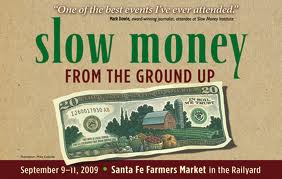 Slow Money an organization “advocating investing 50% of our money within 50 miles of our home, specifically in organic and sustainable local food, farms, and processing.”
Slow Money an organization “advocating investing 50% of our money within 50 miles of our home, specifically in organic and sustainable local food, farms, and processing.”
In order to get that locally grown food to market, there will have to be a low tech, low carbon, transportation system in place. The Hudson River, the Bays and tributaries to New York/New Jersey Harbor, and the Long Island Sound are the “highways of the future” for sailing cargo vessels. One such enterprise is the Vermont Sail Freight Project.
A complementary proposal called HARVEST The Harbor and River Vessel Transport Company will be a short sea shipping business delivering local produce and seafood throughout the New York/New Jersey Harbor. HARVEST will be a “for benefit” company based on the Farm Boat concept in Seattle and the Island Market Boat in Maine.
Historically, thousands of vessels plied the waters to and from cities on the Harbor and the farming areas of New Jersey and the Hudson Valley delivering fresh local farm produce, fish, shellfish, and passengers to ports along the way. The Hudson River and the Harbor was once a bustling highway linking even the smallest communities into a web of regularly scheduled routes. Farmers, dairymen, and oystermen relied on this vibrant and diverse fleet of vessels to bring their goods to market and to receive supplies. The schooners, sloops, and steam boats provided a unique way of life for early inhabitants. For those who worked the inland waters of the Northeast, the romance of the sea was a common element in their lives.
Today, the water highways still exist and need to be reinvigorated. Maintaining maritime trade routes is more than just a celebration of tradition. In a carbon constrained future sustainable water transport will be necessary and in the event of a regional disaster water-based community links can serve as vital infrastructure to the NY/NJ Harbor region.
NRDC’s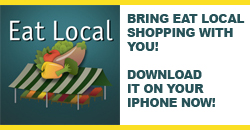 Smarter Living site asks the question, “Like the idea of eating seasonal produce grown on regional farms but wonder what’s in season near you this week?” And includes search tools to find out where to get seasonal local foods and maps to nearby farmers’ markets and even includes directions by car, bike, walking and public transit. The site also has a smart phone application to help you locate what you are looking for. .
Smarter Living site asks the question, “Like the idea of eating seasonal produce grown on regional farms but wonder what’s in season near you this week?” And includes search tools to find out where to get seasonal local foods and maps to nearby farmers’ markets and even includes directions by car, bike, walking and public transit. The site also has a smart phone application to help you locate what you are looking for. .

